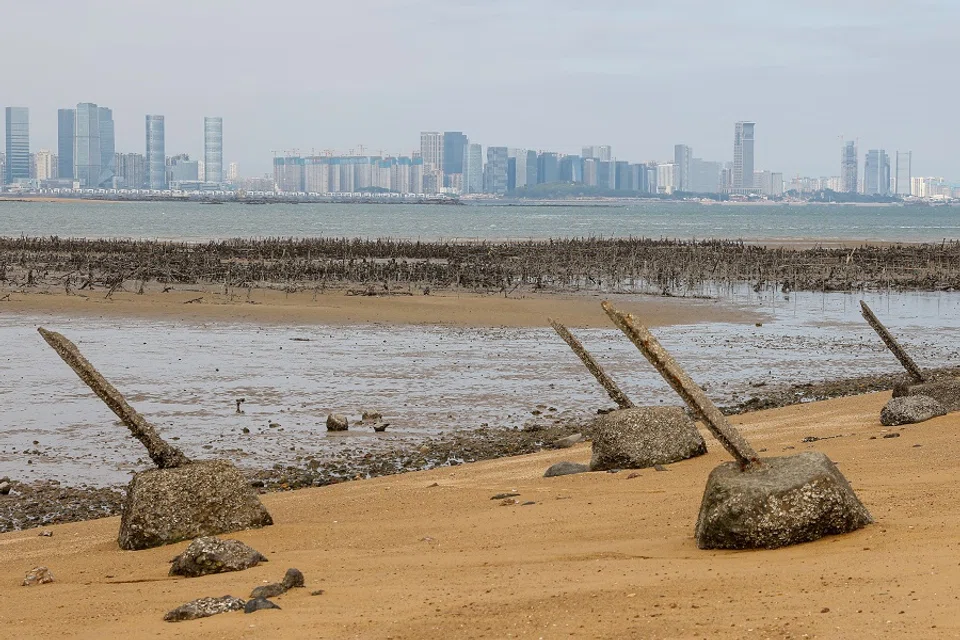From Kinmen to the South China Sea: Weaponising narratives
In cases like the Kinmen capsizing incident and in its dealings with the Philippines, China uses its own interpretation of history and international law to launch a narrative where it is the aggrieved party, says Philippine academic Charmaine Misalucha-Willoughby. She cautions that crafting a narrative requires anchoring it in strategy instead of being knee-jerk reactions that can lead nations down paths best avoided.

On 14 February 2024, a Chinese fishing boat entered Taiwan's restricted waters off Kinmen. The Taiwan Coast Guard Administration (CGA) attempted to intercept the fishing boat, but the latter tried to escape in a zigzagging fashion. On a sharp turn, the fishing boat collided with the CGA patrol boat which caused it to capsize. Two of the four fishermen died in the incident.
A few days later, China's Taiwan Affairs Office (TAO) spokesperson said, "There has never been such a thing as 'off-limit' or 'restricted waters' in the fishing zones." After that, the Chinese government announced increasing patrols around Kinmen, and the Chinese Coast Guard (CCG) boarded a tourist boat for inspection. The incident sparked panic because it was an unusual practice since Taiwan established prohibited and restricted waters near the Kinmen and Matsu islands in the early 1990s. By 21 February 2024, two CCG vessels and a surveillance ship were spotted near Taiwan's Matsu Island.
These activities are not new. In the past years, China's presence in Taiwan's outlying islands included illegal fishing operations and sand-dredging. Considered a new weapon in its grey zone toolbox, China has been dredging in the shallow waters near the median line of the Taiwan Strait. In 2020, Taiwan reported a 560% increase in Chinese sand dredgers and sand-transporting vessels expelled from its waters. Apart from these activities, China has also been using research vessels to skirt Taiwan and gather intelligence. These vessels collect data on the marine environment, which is critical to non-military and commercial research, but they also have dual-use applications and can support military intelligence.
... China uses its own interpretation of history and international law to launch a narrative where it is the aggrieved party.
Similar tactics applied in skirmishes with the Philippines
These activities notwithstanding, China projects itself as the wronged party in the capsizing incident. Given the two casualties, this is understandable. Still, the irony is that Taiwan's exercise of its jurisdiction resulted in China's use of the narrative to challenge the restricted areas delineated in the 1992 Cross-Strait Act. China uses a tactic similar to the one used in the Philippines.
On 23 March, the Armed Forces of the Philippines (AFP) and the Philippine Coast Guard (PCG) were on a routine rotation and resupply mission to the BRP Sierra Madre in Ayungin Shoal. Vessels of the CCG and the Chinese maritime militia then deployed manoeuvres, including the use of water cannons, that caused damages to the supply vessels and injuries to Philippine personnel.
China's statement condemned the Philippines for "intruding" in its waters and "deliberately disrupting the peace and stability of the South China Sea", despite the 2016 arbitration award that determined China's claims to historic rights are without legal effect and that Ayungin Shoal is, in fact, within the Philippines' exclusive economic zone. This latest incident has already garnered wide support from members of the international community. In latest developments on 25 March, each side's foreign affairs ministry issued further "warnings" to the other.

Previous incidents have involved the PCG and the CCG in numerous resupply missions to the BRP Sierra Madre. Before the 23 March incident, the Manila Times published an article quoting a Chinese official that the Philippines ignored China's proposals in the West Philippine Sea. China wanted the Philippines to stop transporting materials to reinforce the Sierra Madre, and in return, it would allow the Philippines one vessel through during regular resupply missions. Apparently, former President Rodrigo Duterte made this tacit agreement with China.
The newspaper report also highlighted President Ferdinand Marcos Jr's inaction over 11 concept papers that China submitted to the Philippines. The Philippines' Department of Foreign Affairs issued a statement in response to the Manila Times article. It underscored that the bilateral negotiations are confidential and that China's proposals could not be considered without violating the Philippine constitution or the country's commitments to international law. Clearly, China uses its own interpretation of history and international law to launch a narrative where it is the aggrieved party.
... China portrays itself as a benign hegemon, although it is often a victim of being misunderstood, i.e. its friendly engagements are often mistaken for actions that equate to subverting the long-entrenched rules-based order.
Shaping the narrative
A final example of how narratives are weaponised can be traced to the early days of Russia's invasion of Ukraine. Many Filipinos' immediate reaction on social media was to be neutral, which then-President Duterte leveraged to prevent the country from becoming a pawn of the West. By this logic, not taking sides was considered admirable insofar as standing up to the West. China was also advancing a similar script at the time, stating that the Philippines should remain neutral in increasing tensions between great powers and resist American influence. The narrative further suggested that aligning with the US - despite being longstanding allies - would only be detrimental to the Philippines.
In this context, if China is seen as behaving assertively in the South China Sea, it is only because it is left with no other choice. Others, i.e. the US and the Philippines, are to blame for backing China against a proverbial wall where its only option was to defend itself. Along the same line, this narrative implies that since all great powers operate under a zero-sum logic, at least China has never been a colonial master. Hence, a country like the Philippines, which has deep colonial scars from the US, is better off cooperating with China so that together, they can stand up to the West. In short, China portrays itself as a benign hegemon, although it is often a victim of being misunderstood, i.e. its friendly engagements are often mistaken for actions that equate to subverting the long-entrenched rules-based order.
Crafting a narrative requires anchoring it in strategy instead of being knee-jerk reactions that can lead nations down paths best avoided.
These examples exhibit how states can easily manipulate and use narratives to their advantage. Words are not cheap, and stories are not innocuous. Indeed, words, stories and narratives can shape discourses and propel foreign policies in specific directions. If there is a lesson in the above incidents, it is that a state needs to carefully plot its course in the short, medium and long term. Crafting a narrative requires anchoring it in strategy instead of being knee-jerk reactions that can lead nations down paths best avoided. Taiwan's stance has so far been to support international norms and practices. The Philippines' narrative under Duterte aligned with China's, whereas the current Marcos administration is more in line with the US. Meanwhile, China's ability to use its own interpretations of history and international law to its advantage may seem that it is winning. Still, the extent to which states can twist narratives in the face of widespread and sustained domestic and international public opinion is not limitless.





![[Photos] Fact versus fiction: The portrayal of WWII anti-Japanese martyrs in Taiwan](https://cassette.sphdigital.com.sg/image/thinkchina/3494f8bd481870f7c65b881fd21a3fd733f573f23232376e39c532a2c7593cbc)